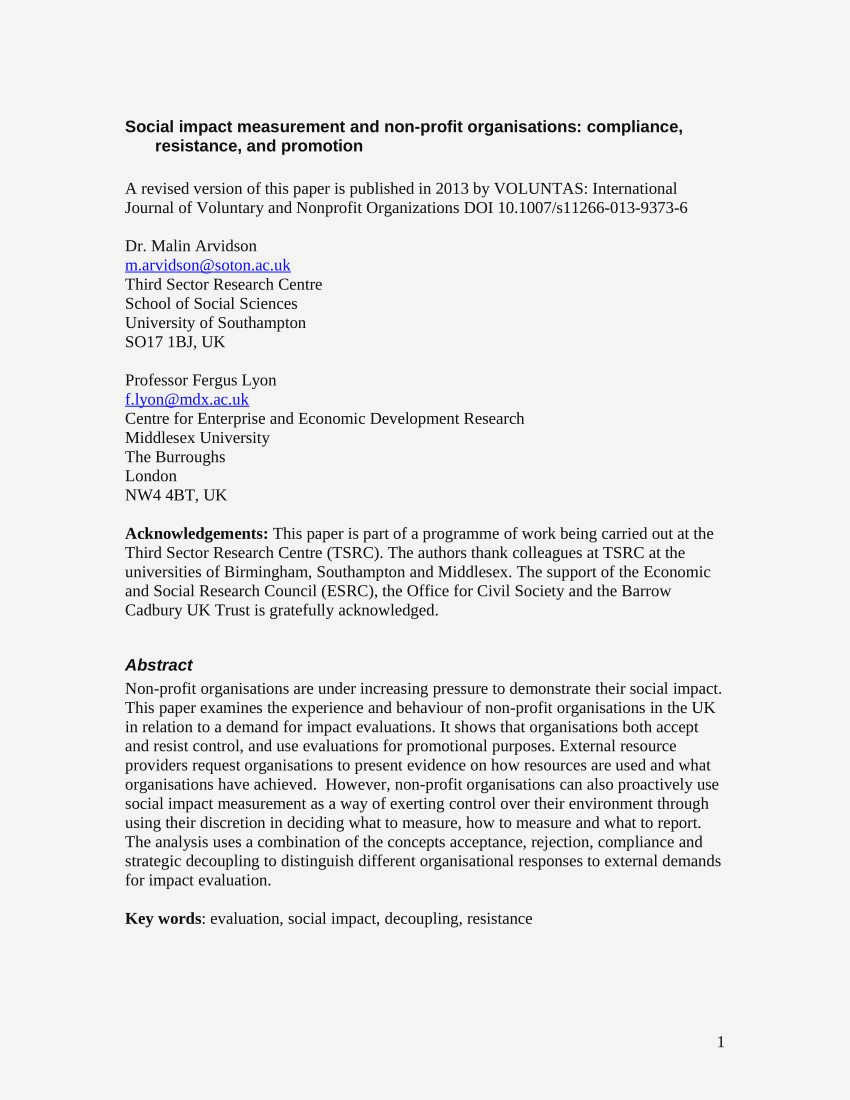Measuring the social impact of civil society organizations is crucial for understanding and strengthening their contribution to society. Civil society plays a vital role in addressing social issues, advocating for marginalized groups, and promoting human rights. By measuring their impact, these organizations can effectively assess their progress, identify areas for improvement, and make informed decisions to maximize their positive influence.
One of the key reasons why social impact measurement is important is that it allows civil society organizations to demonstrate the value of their work to stakeholders, including funders, partners, and the general public. By quantifying the social outcomes and impact achieved, these organizations can provide evidence of their effectiveness and attract support and resources for their initiatives. The ability to measure and communicate impact is particularly critical in today’s competitive funding landscape, where donors and investors increasingly demand accountability and results-based approaches.
In addition to accountability and resource mobilization, social impact measurement enables civil society organizations to learn from their experiences and improve their strategies and operations. Through rigorous data collection and analysis, organizations can identify what works and what doesn’t, and adjust their activities accordingly. This iterative process of learning from impact measurement strengthens their capacity to create sustainable, long-term social change.

Furthermore, social impact measurement provides a framework for collaboration and knowledge sharing among civil society organizations. By sharing their impact data and methodologies, organizations can collectively strengthen their practices, improve measurement techniques, and foster innovation. This collaborative approach not only enhances the sector’s credibility but also helps build a stronger civil society ecosystem that is better equipped to address complex social challenges.
In conclusion, social impact measurement is a powerful tool for civil society organizations to assess, demonstrate, and improve their contribution to society. It enables them to attract support, learn from their experiences, and collaborate with others to create positive social change. By investing in robust measurement systems and methodologies, civil society organizations can enhance their effectiveness and maximize their impact on the communities they serve.
The Role of Social Impact Measurement in Strengthening Civil Society
Social impact measurement plays a crucial role in strengthening civil society by providing a clear understanding of the outcomes and impact of various social initiatives. It enables organizations to identify the effectiveness of their programs and make informed decisions for future strategies.
Measurement allows civil society organizations to demonstrate their value and impact to stakeholders, including funders, donors, and the public. By quantifying their social impact, organizations can illustrate the positive changes they bring about in communities, thereby increasing their credibility and attracting more support.
Moreover, social impact measurement helps civil society organizations to prioritize and allocate resources effectively. By evaluating the outcomes of their initiatives, organizations can identify areas of strength and areas that require improvement. This data-driven approach enables them to focus on programs that yield the most significant outcomes and make adjustments where necessary.
Benefits of social impact measurement in civil society:
- Accountability: Measurement allows civil society organizations to be accountable for their actions and results. By quantifying their impact, they can demonstrate their commitment to making a positive difference.
- Learning and improvement: Social impact measurement provides organizations with valuable insights into what works and what doesn’t. It allows them to learn from their successes and failures and continually improve their strategies and programs.
- Collaboration: By measuring and reporting their social impact, civil society organizations can collaborate more effectively with other stakeholders, including government agencies, businesses, and community members. This collaboration enhances collective efforts towards addressing complex social issues.
- Resource mobilization: Measurement helps civil society organizations attract funding and resources by providing evidence of the impact they have on individuals and communities. It increases their chances of securing financial support and partnerships.
In conclusion, social impact measurement plays a vital role in strengthening civil society by providing evidence of the value and impact of their initiatives. It enables organizations to be more accountable, learn and improve, collaborate effectively, and mobilize resources. By investing in measurement practices, civil society organizations can enhance their contributions to creating positive social change.
Understanding Civil Society’s Contribution
Civil society plays a crucial role in society by addressing social issues and promoting positive change. It encompasses a wide range of organizations, such as non-profit organizations, community groups, and advocacy groups, that work to improve people’s lives and influence policy decisions.
One key aspect of civil society’s contribution is its ability to provide a voice for marginalized and vulnerable communities. These organizations often work directly with these communities, understanding their needs and challenges, and advocating on their behalf. By giving voice to those who may not otherwise be heard, civil society helps to ensure that the concerns of all members of society are represented and taken into account.
Another important role played by civil society is in holding governments accountable. By monitoring government actions and policies, civil society organizations can identify areas where there may be a lack of transparency or where the rights of citizens are being violated. They can then advocate for changes or raise awareness about these issues, ultimately helping to ensure that governments are serving the best interests of their citizens.
Civil society also contributes to the development of innovative solutions to social problems. Non-profit organizations, community groups, and other civil society organizations often have a deep understanding of the communities they serve and the challenges they face. This knowledge allows them to develop innovative approaches and solutions that may not have been considered by government or other stakeholders. By driving innovation, civil society can help to address social problems in new and effective ways.
In conclusion, civil society’s contribution is multifaceted and diverse. It provides a voice for marginalized communities, holds governments accountable, and develops innovative solutions to social issues. Understanding and measuring the impact of civil society’s work is crucial for strengthening its contribution and ensuring that it continues to make a positive difference in society.
Measuring the Impact
Measuring the impact of social initiatives is crucial for evaluating their effectiveness and ensuring that they are making a tangible difference in society. By quantifying the outcomes and outputs of these initiatives, organizations can better understand their impact on individuals, communities, and society as a whole.
To measure the impact, organizations can utilize a variety of tools and methods. They can collect and analyze data on various indicators, such as the number of people reached, the level of engagement, and the changes in behavior or attitudes observed. This data can be gathered through surveys, interviews, focus groups, or even social media analytics.
It is important to note that measuring impact goes beyond simply collecting numbers. It also involves understanding the context in which the initiatives operate and the pathways through which they bring about change. This requires a deeper analysis that takes into account the social, economic, and political factors that influence outcomes.
Evaluating impact is crucial not only for demonstrating the effectiveness of social initiatives but also for improving them. By understanding what works and what doesn’t, organizations can refine their strategies and make informed decisions about resource allocation. This helps them maximize their impact and achieve their goals more efficiently.
An effective measurement framework should be transparent and inclusive, involving all stakeholders in the process. This ensures that the evaluation is comprehensive and reflects the diverse perspectives and experiences of those affected by the initiatives. It also promotes accountability and learning, as organizations can share their findings and collaborate with others to improve their practices.
In conclusion, measuring the impact of social initiatives is crucial for strengthening civil society’s contribution to positive change. By collecting and analyzing data, understanding the context, and involving stakeholders, organizations can better evaluate their effectiveness and maximize their impact. This ultimately leads to more informed decision-making and the ability to make a meaningful difference in society.
The Importance of Social Impact Measurement
Social impact measurement plays a crucial role in evaluating the effectiveness and success of social initiatives and programs. By measuring the social impact of these initiatives, organizations can gain a better understanding of the outcomes and effects they have on individuals, communities, and society as a whole.
One of the main reasons why social impact measurement is important is its ability to demonstrate the value and benefits that social programs bring to society. By quantifying and documenting the positive changes and improvements resulting from these initiatives, organizations can provide evidence of their impact and justify their efforts. This is particularly important when seeking funding or support from stakeholders and donors.
Social impact measurement also helps organizations to identify areas where they can improve and refine their programs. By collecting data on the outcomes and effects of their initiatives, organizations can identify what is working well and what needs adjustment. This allows them to make evidence-based decisions on how to best allocate resources and improve their overall impact.
Furthermore, social impact measurement helps to prioritize resources and interventions. By understanding the social impact of different initiatives, organizations can prioritize those that have the greatest potential for positive change. This ensures that resources are allocated in a way that maximizes their impact and creates the most benefit for those in need.
Lastly, social impact measurement enables organizations to be accountable and transparent to their stakeholders and the wider community. By measuring and reporting on their social impact, organizations can demonstrate their commitment to creating meaningful change and building a stronger civil society. This transparency also builds trust and credibility, which is essential for maintaining support and attracting new partners and supporters.
Overall, social impact measurement is a powerful tool that allows organizations to understand, demonstrate, and improve the outcomes and effects of their social initiatives. By measuring and evaluating impact, organizations can make informed decisions, prioritize resources, and create positive change in society.
Enhancing Accountability and Transparency
In order to strengthen civil society’s contribution and create a positive social impact, it is essential to enhance accountability and transparency within organizations and projects. Accountability ensures that organizations are responsible for their actions and decisions, while transparency promotes openness and honesty in sharing information.
One way to enhance accountability and transparency is by implementing clear and comprehensive reporting mechanisms. Organizations should establish systems that allow them to track and measure the impact of their activities. This includes collecting data, analyzing it, and reporting on the results achieved.
Monitoring and evaluation are key components of enhancing accountability and transparency. Organizations should regularly assess and evaluate their activities to ensure they are aligned with their goals and are making a meaningful impact. This includes setting measurable targets, collecting data, and analyzing the results to identify areas for improvement or success.
Furthermore, organizations should strive to engage stakeholders in the decision-making and evaluation processes. This can be done through open forums or consultations where individuals and communities affected by the organization’s work can provide feedback and input. By involving stakeholders, organizations can ensure that their actions are relevant and meet the needs of the communities they serve.
Transparency can also be enhanced through the sharing of information and results. Organizations should provide regular updates on their activities, impact, and finances to stakeholders and the public. This can be done through annual reports, newsletters, or online platforms. By being transparent with their actions and results, organizations can build trust and credibility with their stakeholders.
Learning and sharing best practices is another way to enhance accountability and transparency. Organizations should be open to learning from others and sharing their own experiences. This can be done through participating in conferences, workshops, or communities of practice. By sharing knowledge and best practices, organizations can improve their own work and contribute to the overall strengthening of civil society’s impact.
Strengthening Decision-Making Processes
Measurement of social impact plays a crucial role in strengthening decision-making processes within civil society organizations. By collecting and analyzing data on the outcomes and effects of their programs and initiatives, organizations can make more informed decisions about resource allocation and program adjustments.

One way to strengthen decision-making processes is through the use of data-driven insights. By measuring social impact, organizations can identify areas of success and areas for improvement. This information can then be used to inform strategic planning and decision-making processes. For example, if an organization finds that a particular program is not having the desired impact, they can adjust their approach or reallocate resources to other initiatives that are showing more promising outcomes.
Another way that social impact measurement strengthens decision-making processes is by providing evidence of effectiveness. By quantifying the social impact of their programs, organizations can demonstrate the value and effectiveness of their work to donors, stakeholders, and the wider community. This evidence can be used to attract funding and support, as well as to advocate for policy changes or increased resources.
Social impact measurement also facilitates learning and knowledge sharing within civil society organizations. By collecting data on outcomes and effects, organizations can identify best practices and lessons learned that can be applied to future initiatives. This allows organizations to make more informed and evidence-based decisions, increasing the likelihood of positive social change.
In conclusion, social impact measurement is a powerful tool for strengthening decision-making processes within civil society organizations. By collecting and analyzing data on the outcomes and effects of their programs, organizations can make more informed decisions about resource allocation, improve program effectiveness, and advocate for increased support. Ultimately, this leads to more impactful and sustainable initiatives that contribute to positive social change.
Aligning Strategies and Goals
Aligning strategies and goals is a crucial step in measuring social impact and strengthening the contribution of civil society. When organizations and individuals work towards a common vision, it allows for more effective collaboration and coordination of efforts. By aligning strategies and goals, civil society can maximize its impact and strive towards a shared purpose.
One way to align strategies and goals is through the development of a clear and comprehensive theory of change. This involves mapping out the desired outcomes, identifying the key stakeholders and their roles, and understanding the pathways to achieving the intended impact. By having a shared understanding of the theory of change, organizations and individuals can align their strategies and actions to work towards the same goals.
Another approach to aligning strategies and goals is through regular communication and collaboration among stakeholders. This can be done through formal processes such as meetings and workshops, as well as informal networking and knowledge-sharing. By fostering an environment of open communication, civil society can ensure that everyone is on the same page and working towards the common goal.
Furthermore, it is important to regularly review and evaluate the progress towards the aligned strategies and goals. This can be done through monitoring and evaluation frameworks that measure the impact and outcomes of the actions taken. By collecting and analyzing data, civil society can identify areas of strength and areas for improvement, making it possible to adjust strategies and goals accordingly.
In conclusion, aligning strategies and goals is essential for measuring social impact and strengthening civil society‘s contribution. By having a clear theory of change, fostering communication and collaboration, and regularly reviewing progress, civil society can maximize its impact and work towards a shared purpose.
Mobilizing Resources Effectively
In order for civil society to make a meaningful impact, it is crucial to mobilize resources effectively. This involves not only financial resources, but also human capital, knowledge, and networks. By efficiently mobilizing these resources, civil society organizations can maximize their impact and reach more beneficiaries.

Financial Resources: One key aspect of mobilizing resources effectively is securing financial support. Civil society organizations need funding to carry out their programs and initiatives. This can be done through various means, such as grants, donations, and partnerships with businesses and government agencies. It is important for organizations to have a clear and compelling case for support, as well as a strong fundraising strategy to attract donors and sustain their activities.
Human Capital: Another important resource for civil society organizations is human capital. This includes the skills, expertise, and passion of individuals who are dedicated to making a difference. By engaging volunteers and staff members who are aligned with the organization’s mission, values, and goals, civil society organizations can leverage their collective strengths to create positive change.
Knowledge and Networks: Additionally, mobilizing knowledge and networks is essential for effective resource mobilization. Civil society organizations can tap into existing networks and partnerships to access valuable information, expertise, and contacts. This can help organizations identify new funding opportunities, collaborate with like-minded organizations, and learn from others’ experiences and best practices.
Monitoring and Evaluation: Lastly, in order to mobilize resources effectively, civil society organizations need to monitor and evaluate their impact. By measuring their outcomes and assessing the effectiveness of their programs, organizations can demonstrate their value and attract continued support. Monitoring and evaluation also allows organizations to identify areas for improvement and make informed decisions about resource allocation.
To summarize, mobilizing resources effectively is crucial for civil society organizations to strengthen their contribution. By securing financial resources, engaging human capital, leveraging knowledge and networks, and implementing monitoring and evaluation processes, organizations can maximize their impact and create lasting social change.
Demonstrating Value and Results
Measuring and Reporting Social Impact
In order to strengthen civil society’s contribution, it is important to measure and report on the social impact of their initiatives. This allows organizations to demonstrate the value and results of their work, which is essential for attracting funding, garnering support, and building trust with stakeholders.
Measuring social impact involves collecting and analyzing data to assess the extent to which an organization’s activities are achieving their intended outcomes. This includes evaluating the effectiveness of programs and projects, as well as the broader social change they are seeking to create.
Reporting on social impact involves transparently communicating the results of these assessments to various stakeholders, such as donors, beneficiaries, and the wider public. This can be done through impact reports, case studies, success stories, and other means of storytelling that highlight the tangible and intangible benefits that have been achieved.
The Importance of Demonstrating Value
Demonstrating value is crucial for civil society organizations as it allows them to create a compelling narrative around the impact of their work. This narrative can help to engage and inspire stakeholders, including potential funders, volunteers, and partners.
By clearly articulating the value they create, civil society organizations can differentiate themselves from other actors and highlight the unique contribution they make to society. This is especially important in an increasingly crowded social sector, where competition for resources and attention is high.
In addition, demonstrating value and results can also be a powerful tool for advocacy and influencing policy. By providing concrete evidence of the impact they have, civil society organizations can make a stronger case for support and shape public opinion and decision-making in ways that align with their mission and goals.
Promoting Learning and Continuous Improvement
In order to strengthen the contribution of civil society organizations, it is essential to promote learning and continuous improvement. This involves actively seeking feedback, analyzing data, and using it to inform decision-making and programmatic improvements.
One way to promote learning is by establishing a culture of evaluation within civil society organizations. This involves regularly assessing the impact of their programs and initiatives, and using the findings to make informed decisions about resource allocation and strategy. By measuring impact and collecting data, organizations can identify areas of success and areas for improvement.
Another important aspect of promoting learning is through knowledge sharing and collaboration. Civil society organizations can learn from each other’s experiences and best practices, and use this knowledge to improve their own work. This can be done through conferences, workshops, and other networking events where organizations can come together to share lessons learned and discuss strategies for improvement.
Additionally, technology can play a crucial role in promoting learning and continuous improvement. By utilizing data collection tools and analysis software, organizations can track their progress and measure their impact in a more efficient and effective way. This can help identify trends and patterns, as well as identify areas where interventions are most effective.
Overall, promoting learning and continuous improvement is crucial for strengthening civil society’s contribution. By collecting data, sharing knowledge, and utilizing technology, organizations can become more informed and strategic in their approach, leading to more impactful and sustainable outcomes.
Fostering Collaboration and Networking
In order to strengthen civil society’s contribution to social impact, fostering collaboration and networking among different organizations and stakeholders is of utmost importance. By working together and sharing resources, knowledge, and expertise, civil society organizations can maximize their collective impact and address complex social issues more effectively.

Collaboration allows organizations to pool their strengths and create synergies that can lead to innovative and sustainable solutions. Through collaboration, organizations can leverage each other’s networks, access new funding opportunities, and expand their reach and influence. Collaborative efforts also enable organizations to learn from each other’s successes and failures, leading to continuous improvement and increased efficiency in their operations.
Networking plays a crucial role in establishing connections, building relationships, and creating partnerships. By networking with other organizations, civil society groups can access a larger pool of resources, expertise, and potential collaborators. Networking also facilitates the exchange of ideas and best practices, enabling organizations to learn from successful models and replicate them in their own contexts.
In addition to traditional forms of collaboration and networking, digital platforms and technologies offer new opportunities for enhanced connectivity and knowledge sharing. Online platforms, such as social media, forums, and virtual communities, can connect organizations from different geographical locations, promoting cross-sectoral collaboration and the exchange of ideas on a global scale.
Furthermore, fostering collaboration and networking not only strengthens the impact of civil society organizations but also enhances their credibility and influence. By demonstrating a commitment to collaboration and networking, organizations can attract funders, partners, and volunteers who are looking to support impactful and sustainable initiatives. This, in turn, can lead to increased funding, partnerships, and resources, further enhancing the ability of civil society to address critical social challenges.
In conclusion, fostering collaboration and networking is vital for strengthening civil society‘s contribution to social impact. By working together, sharing resources, and leveraging networks, organizations can magnify their impact, learn from each other, and access new opportunities. Through collaboration and networking, civil society organizations can create lasting change and make a significant difference in the communities they serve.





